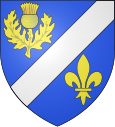Nogent-sur-Oise
| Nogent-sur-Oise | ||
|---|---|---|

|
|
|
| region | Hauts-de-France | |
| Department | Oise | |
| Arrondissement | Senlis | |
| Canton | Nogent-sur-Oise (main town) | |
| Community association | Creil Sud Oise | |
| Coordinates | 49 ° 16 ′ N , 2 ° 28 ′ E | |
| height | 27-100 m | |
| surface | 7.46 km 2 | |
| Residents | 20,033 (January 1, 2017) | |
| Population density | 2,685 inhabitants / km 2 | |
| Post Code | 60180 | |
| INSEE code | 60463 | |
| Website | www.nogentsuroise.fr | |
Nogent-sur-Oise is a French municipality with 20,033 inhabitants (at January 1, 2017) in the department of Oise in the region of Hauts-de-France . It is located on the River Oise , near the confluence of its tributary Brèche , about 50 kilometers north of Paris , 35 kilometers from Compiègne and 40 kilometers from Beauvais . The municipality was the capital of the canton Creil-Nogent-sur-Oise until its dissolution , since then it has been the capital of the canton of Nogent-sur-Oise, founded in 2015 .
Until 1906 the city was also called Nogent-les-Vierges.
Skull find
In 1816 Jean-Denis Barbié du Bocage (1760–1825) presented a skull found in Nogent-les-Vergiers with an exceptionally large trepanation that did not prevent its owner from living for many years (according to Frédéric Cuvier (1773–1838 ) 12 years).
Town twinning
- Gersthofen , Bavaria , Germany (since 1969)
- Beverley , United Kingdom (since 1998)
- Krasnik , Poland (since 2005)
traffic
Nogent is one kilometer from Creil , which can be reached in 30 minutes from the Paris Nord train station ( Gare du Nord ) and on national road 16. The community can also be reached from the capital via the A1 motorway ( Senlis exit ).

